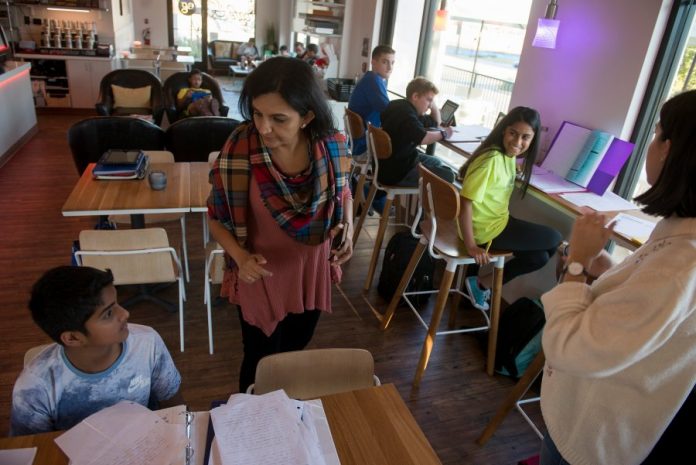
The middle-school years are considered by most people to be … the worst of all age groups. Maybe that’s why most adults try so hard not to remember them.
The average pre- to early-teenager walks out their front door to go to school in the morning wearing clothes that fit and come home in high-water pants, tops with sleeves too short and toes bumping the end of their two-week-old shoes.
They rush to after-school activities, rush through dinner to get through piles of homework and go to sleep too late at night; only to wake-up with a Frisbee-sized zit the next morning. And, with today’s social media … any real blemish– in addition to fictional criticism posted by insecure bullies– is magnified.
As if all that isn’t bad enough, there’s the “S” issue. No, not that “S” issue, although that’s connected. The “S” issue is studying.
“The middle school years are when the brain is still under construction,” said Manu Shahi of Flower Mound, owner of Homework in a Café. “But, it’s focus is only emotional; driven by body chemistry [puberty].”
Shahi’s dedication to children dates back to 2002 and her commitment to the Make-A-Wish Foundation, when her then two-and-a-half-year-old daughter, Janvi, was diagnosed with leukemia; which went into remission after treatments. Janvi was granted her wish and Shahi became a Wish Granter; then entered the field of education.
Until this June, she ran a Kumon Learning Center in Highland Village for 10-years, where she helped teenagers achieve their learning goals, but she has now embarked upon a new venture; using that experience as a foundation.
Her status as a Certified Academic Life Coach has enabled Shahi to offer coaching to tweens, teens and college students: “To create a system that combines academic skills with life skills.”
Today’s middle-schoolers will hit the prime job market in 2030. They need to master executive functions and skills– such as time-management, organization, project-management, how to collaborate, self-management, emotional development and relationship communication.
We use those skills to set goals, plan how we are going to prioritize, remember things, manage our time and possessions and finish what we started, even if we are not motivated; the mental ability we all use every day to get things done.
During her Kumon experience, Shahi said she’d also become a counselor for parents about how to help their students, too.
“Our kids today are smart and resourceful, but still, a gap exists between parents and kids. A gap that has widened, due to lack of quality time, social media and just because of a weak connection.”

She encourages parents to spend time with their children and, while doing so, listen to them and exercise patience with them. One piece of advice she offers to parents is: “You need to connect the dots, before you correct the dots.”
Responding to a questionnaire Shahi gave her students, one complaint directed at parents was: “Let me own my own grade,” while another was “If I say ‘no,’ respect that– don’t make me go somewhere I won’t enjoy and will be a waste of my time.”
Typically, they are not ready to open-up to parents or listen to any advice about skills they need to thrive.
The future of learning is to make it fun– in a relaxed environment said Shahi. Her Homework in a Café program has students work on their homework in a laid-back environment, while they use an executive skill, based on their Individual Learning Profile (ILP) developed by Shahi, as well as being monitored for progress.
As an example of the program’s success is how one student reduced a week’s time spent to complete an assignment, to only 25-minutes completing a similar assignment using newly-learned skills.
The students are coached both one-on-one and in a group setting on targeted skills and are accountable to use them on regular basis. In addition, guest speakers have been brought in for specific topics, such as essay-writing.
As an educator, Shahi champions building self-confidence in students. She said that it is a teacher’s responsibility: “To find the potential in the child and show it to them, so that they build up their confidence and start achieving things on their own.”
There’s now software that can track and make the ILP for each student, based on individual academic achievements, outside activities, motivation level strengths and challenges, as well as the style of teaching/learning best fits: blueprint, action, nurturing and knowledge.
The software helps decide in which career tracks the student has interest, executive strengths and weaknesses.
“I give their brain a break every 45-minutes to eat something or go outside and chat,” said Shahi. “Sometimes it’s about what they learned– or didn’t understand– in a class. Sometimes, they’ll just sit and watch the traffic drive by; when do you ever see a teenager just sit and watch cars.”
She added that the best thing is how they “communicate” without gadgets; they don’t even ask to use a device.
“I am looking forward to help students in this grade bracket become confident learners who are developing skills,” Shahi said.
By targeting middle school students, Shahi hopes to lessen the stress and depression of high school students all too common in today’s society.
“I am currently in talks with a few PTA’s, schools and cafés to grow the program to more locations,” said Shahi. “Currently, we offer classes at Epic Gelato [in Lakeside DFW] and my students love the gelato!”
For more information about Homework in a Café, visit the Facebook page: www.facebook.com/Homeworkinacafe.








 GIF.gif)








